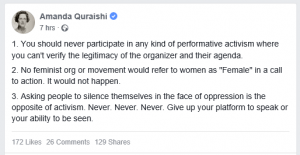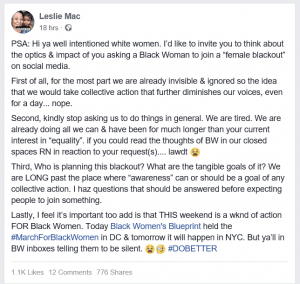This weekend many women across Facebook have been sharing a chain mail message amongst one another to promote “female blackout”, a movement which involves changing your profile picture to a black square to make men wonder where all the women are.
The chain message reads as follows:
“Tomorrow, female blackout from 8:00 a.m. to 9:00 p.m. It’s a movement to show what the world might be like without women. Your profile photo should just be a black square so that men wonder where the women are. Pass it only to women… It’s for a project against domestic abuse. It is no joke. Share it.”
Whilst the intention behind this movement is positive, there has been a few issues raised following the circulation of the message.
Firstly, that a black out day where women are supposed to disappear is counterproductive, as women are already silenced and made invisible enough without participating in their own black out.
Secondly, that it is problematic, to say the least, to ask black women to erase themselves with a black square.
The first point was raised by Amanda Quraishi, a diversity activist, who shared her opinion on the matter publicly on Facebook stating that “asking people to silence themselves in the face of oppression is the opposite of activism”. Her post, which was shared 129 times so far, has received a flurry of comments in support of her statement.
Leslie Mac discussed the second point similarly in a public Facebook post of her own, inviting women sharing the chain mail message to think about the impact of encouraging black women to participate in the black out. She said that “for the most part, we are already invisible and ignored so the idea that we would take collective action that further diminishes our voices, even for a day… nope”.
Continuing her post, she added that this weekend was one of action for black women, with “March for Black Women” happening in Washington DC on Saturday 29 and in New York City on Sunday 30.
Allyson Kapin, founder of the non-profit organisation Women Who Tech, also had problems with this form of Facebook protest, calling it “useless” in her Forbes article as it is not tied to any organisations, advocacy goal, or strategic impact. She instead highlighted alternative ways women could make an impact, urging them to register to vote and use their voices to express their opinions on issues that impact women, rather than changing their profile pictures to black.

